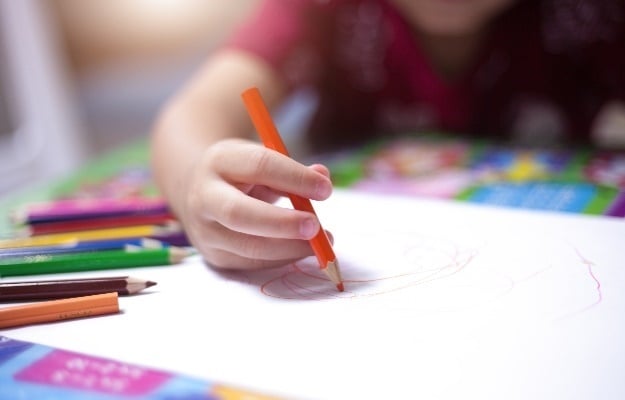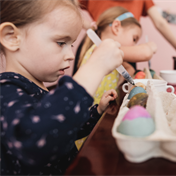
Classrooms lay empty and the playgrounds look bare and abandoned. These are some of the images shared all over the world during lockdown as children are told to stay at home because of the coronavirus outbreak.
For Little Lamps Pre-School in Melrose, an upmarket suburb in Johannesburg; the cheerful voices of little boys and girls appear on the laptop screen as principal and director, Patricia Kyereh conducts her virtual classes for the day.
“We offer online classes for the different age groups via Zoom through Google Classroom. The parents have been consistent in working through the activities with their children, taking pictures and sending reports so we can monitor the children’s progress,” says Patricia.
The pre-school has been running since 2016 and just last year, they moved from Parktown to their new home in Melrose. The big move cost them dearly, from having 31 kids in their care to now just 17 children and seven staff.
Since 18 March, the Department of Social Development announced that early childhood development (ECD) centres and preschools must shut down until further notice.
A recent report issued by the South African Congress for Early Childhood Development (SACECD) titled, The Plight of the ECD Workforce, finds that 68% of ECD operators (including ECD centres, playgroups, day mothers and other early learning programmes) are worried that they won’t be able to reopen after the lockdown. That’s because according to a survey done with 3,952 ECD operators, 99% reported that caregivers and parents have stopped paying fees after the nationwide closures. Furthermore, 83% of operators haven’t be able to pay full staff salaries and 96% reported that their income wasn’t enough to cover their operating costs.
“We’ve been fortunate to have supportive parents who’ve given online learning platforms a chance for us to continue skills development in our preschool children,” says Patricia.
But, Patricia adds, this may not remain so if the lockdown persists as some parents have already expressed their financial concerns.
“School fees are our sole income in order to keep the school running. As this is a global problem, where necessary, staff members have to unfortunately take salary cuts or a temporary layoff,” says Patricia.
Boitumelo Daycare in Rockville (Moroka), Soweto has 42 children registered in their care. The daycare centre has been running with minor glitches since its inception in 2015, but all things turned for the worse after President Cyril Ramaphosa declared the Covid-19 pandemic as a national disaster.
“After the announcement of ECD closures I thought about how I’m going to survive and how I’m I going to pay all my workers,” shares principal and director, Elizabeth Mampai Masilo.
After communicating with the parents, only nine of them paid their children’s fees and the rest have gone absent, informs Masilo.
“I had a meeting with my staff and told them I’m going to have to pay them according to the limited money paid by the parents since we have no funding or other means of income. I also gave them food such as tin food which were left over from the daycare,” Elizabeth says.
Learning continues for the few children via WhatsApp through sponsored learning materials supplied by Unlimited Child to the daycare centre. Elizabeth also has weekly meetings with the teachers to carry on lesson plans and to brainstorm catch-up strategies. However, e-learning has been challenging and sometimes impossible for some parents and their children.
“Parents are battling with creating a learning environment at home for their children. I’ve been informed by some of the parents that their children cry and insist they want to go to school to be taught by their teachers. Some refuse to be taught by their parents which is quite frustrating for us and their parents,” says Elizabeth.
According to educational psychologist, Zandile Shabangu, children stand the risk of unlearning and losing whatever had been taught before the lockdown.
“A catch-up plan should be in place for these little ones which needs to involve caregivers at home. This will hopefully help bridge the gap between what was learnt before the pandemic and manage new information which will be learnt post pandemic,” says Zandile.
There are several good quality resources available that parents can access and print online. However, parents need to make sure that these resources are according to their child’s school curriculum so that they don’t confuse the child, Zandile advises.
“For children in the age group of 0-5 years, parents need to not bombard them with formal learning activities but incorporate whatever play activity they engage in during the day with some type of lesson,” she stresses.
“Children in this group learn best through play activities. This will keep their brains stimulated and active while they remember what was taught at preschool.”
Patricia says that offering virtual learning has been an enlightening experience that has pushed her from her comfort zone of being in the classroom.
“We cover various areas such as fine motor activities, sensory play to the overall wellbeing of the child. I miss the classroom physical component with the children so much. This is a tough season and I pray we’re able to resume to our normal routines soon,” concludes Patricia.
SOURCE: Nelson Mandela Foundation




 Publications
Publications
 Partners
Partners
















